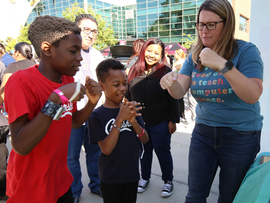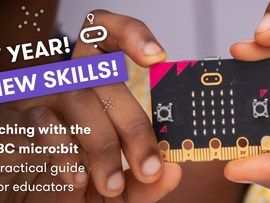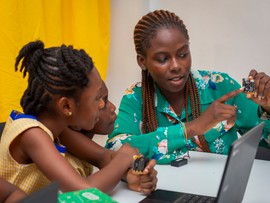Celebrating 10 million micro:bits around the world
2024 has been full of exciting milestones, including the distribution of the 10 millionth micro:bit, the launch of micro:bit CreateAI, and the delivery of numerous impactful partnerships around the world.
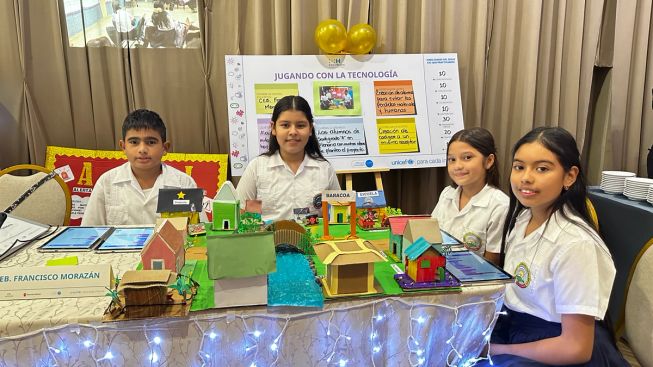
Students demonstrating their micro:bit project at the UNICEF celebration event in Honduras
As digital technologies continue to embed into our lives, it is more important than ever to enable young people to become active and responsible participants. The BBC micro:bit makes coding and computing physical, and is a simple way to provide an entry point for many students.
In the last year we have explored even more ways to do this. With our first steps into the world of AI and machine learning, major projects with Google, UNICEF, Nominet and the BBC, we have expanded our ways of reaching young people to help them realise their creativity through technology.
Our work this year
This year, the Foundation has been working in many ways to catalyse and influence change, with many different types of partners.
Delivering global impact
The Foundation implements programmes with global partners, who engage us to deliver our unique expertise and insight to achieve shared goals to drive worldwide change.
As an implementation arm in the Tinkering with Tech programme, powered by the UNICEF Global Learning Innovation Hub, we worked with the UNICEF country offices in Honduras, Vietnam, the Maldives and Montenegro to develop and deliver localised teacher training programmes.
Accessibility is of utmost important to us, which is why we are pleased to receive funding from the Google Blockly Accessibility Fund. With this, we will work alongside Blockly and Microsoft MakeCode to improve and transform the accessibility of block-based coding over the next three years.
Our work with British Council continues, as they bring digital skills programmes with micro:bit to classrooms worldwide, including Western Balkans, Colombia, South Africa and Algeria, with more in development for 2025.
Catalysing community expertise
Local knowledge is fundamental to developing programmes that are successful in specific contexts. By supporting organisations that are already doing amazing work in their communities, we aim to expand and uplift their work, so they can have the maximum impact.
We worked with Compton Unified School District in the USA to deliver teacher training tailored to the context there, leading to over 12.5k children engaging with the programme in 1 year.
Our long-running partnership with Ceibal in Uruguay continues to drive student engagement and change, as they are working with our new micro:bit CreateAI tool to develop an AI-based curriculum.
These are just a couple of examples of our many partnerships, which run alongside our micro:bit Live regional events, do your :bit challenge, and micro:bit Champions network, which all help to amplify local micro:bit expertise throughout communities.
Supporting teachers
Providing support to teachers is a core part of what we do, and we provide quality, curriculum-linked content and resources for free - whether we create these in-house or in collaboration with others.
In the last year we have continued to add to our bank of useful resources and projects, with resources such as the investigation and paper prototype activities and projects ranging from dance steps, hot and cold game, to the kick strength data logger. This helps to deepen our existing educational programme, which includes our professional development courses, events and lessons.
The BBC micro:bit - the next gen campaign (with fantastic support from Nominet, that saw nearly 700k micro:bits distributed to primary schools across the UK) also gathered momentum. Pupils collected their playground data in our major survey, which included brand-new activities including an activity tracker and an innovative exploration of machine learning. The design competition for the Gladiators also launched, with Phantom and Dynamite calling for exciting fitness gadget designs using the micro:bit.
Launching new products
Adding to our suite of teaching tools, we are very proud to have launched micro:bit CreateAI - a free, web-based tool to explore AI through movement and machine learning, and take it into the real world with a BBC micro:bit. This adds AI to your micro:bit learning experience, by allowing you to train a machine learning model with your own movement data and run it on your micro:bit. It provides tangible ways to think about the data needed in a machine learning model, see how the process works, and run your model through Microsoft MakeCode on a micro:bit.
Alongside this, we also launched a new accessory. The micro:bit wearable provides an easy way to attach your micro:bit to yourself to make the most of CreateAI and other activities.
Ensuring continued support
Our priority is to ensure that the micro:bit ecosystem remains stable and supported for all of our users, and we continually work to ensure more people can use the micro:bit, and that we can constantly learn from how people use it.
With Nominet's generous support, we have made great strides on our accessibility journey this year. As part of this project, we published our accessibility statement, following an external review, to outline the actions we need to take. This project has also enabled us to carry out complex work, such as reviewing the hardware to discover suggestions for adaptations, improving the micro:bit’s preloaded program to better support autistic students and additional support for blind students and those with visual impairments (such as a sign language glossary and a graphic to understand micro:bit components by touch).
We are also working with the Raspberry Pi Computing Education Research Centre at the University of Cambridge on Exploring Physical Computing in Schools (EPICS): a five-year project co-funded by us, Nominet and the BBC. This will research the long-term impact of physical computing on UK primary school pupils’ attitudes and confidence with technology, with a focus on gender.
Our impact
So far, in total:
- 56 millionyoung people have benefitted from learning with the micro:bit
- 10 millionmicro:bits have been distributed
- 60+countries using micro:bit
Between January - December 2024:
- 4 millionactive users across microbit.org, Python editor and micro:bit classroom across the year
- 75 millionblocks coded every month on Microsoft MakeCode
Between September 2023 - August 2024:
- 355micro:bit Champions across 53 countries
- 80+partner organisations that we're working with globally
- 80% of students that had been taught with micro:bit agreed that ‘Computing and technology is easier to understand than other subjects’ versus 52% of those that had not used micro:bit. (BBC micro:bit - the next gen, Platypus research 2024)
- After learning with micro:bit 80% of girls agreed that coding is a useful skill to learn. (Compton Unified School Districts project evaluation, 2024)
- 90% or more teachers said they were confident or very confident to use their learning and the materials provided with their students. (Consolidated research from Compton, Infosys, UNICEF projects and our personal development courses, 2024)
- 84% or more teachers agreed or agreed strongly that using micro:bit resources had increased their confidence in teaching computing. (Consolidated research from Compton, Infosys, BBC next gen projects and the micro:bit Python Editor, 2024)
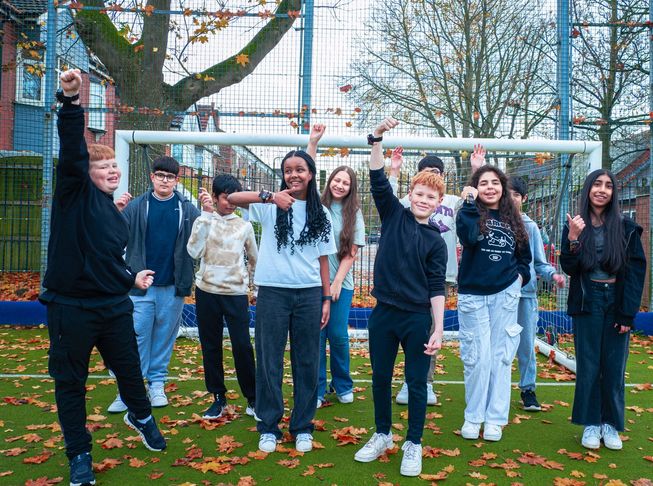
Students using micro:bit CreateAI
Our continued legacy
Since the BBC micro:bit was first launched as part of the BBC’s Make It Digital campaign in 2015, 10 million micro:bits have been distributed around the world.
The Foundation is a not-for-profit organisation, whose focus is on the educational impact of the micro:bit and working with partners that can help us achieve that. We licence the micro:bit technology to our global manufacturers and distributors, Farnell and RS Group, and work closely with our channel partners to ensure that the micro:bit hardware is available easily and cost effectively. We receive a royalty from these activities, that funds our wider educational and research work.
Our vision is to reach 100 million children by 2028, and it’s a goal we can only achieve in collaboration with an extensive network of like-minded partners. We know that the work highlighted here is not comprehensive, as there are many people and organisations around the world using micro:bit to benefit children in lots of ways, and we want to thank our founding partners in particular for their ongoing support. We really appreciate the outstanding work that is happening globally and look forward to 2025.

I am so proud of being a Board member of the Micro:bit Educational Foundation largely because of all the work that they drive. I honestly cannot believe the impact that such a small and mighty team has on the world, in terms of our mission, our reach, our ambition and our collaboration with others to make a positive difference in the world.

Dr. Ambily Banerjee, Board Member, and Senior Director, Clinical Research Equity at Johnson & Johnson

The partnerships that exist between the stakeholders is just phenomenal and it’s very evident through the work that’s being done and the words that are being spoken.

Dr. Sharisa Chan, micro:bit Champion who worked closely on the Compton project

Working closely with the Micro:bit Educational Foundation has enriched the 'Tinkering with Tech' initiative, resonating with our vision to transform education. Through hands-on learning, creativity, and problem solving, the micro:bit enables students to tackle real-world challenges and cultivate a lifelong enthusiasm for STEM and Innovation.

Iñaki Sanchez, Education/EdTech Specialist, UNICEF Global Learning Innovation Hub

Google.org is proud to support Micro:bit Educational Foundation with the Blockly Accessibility Fund in their pursuit to make coding more accessible. We look forward to the future impact they drive with this support from Google.org.

Joe Davis, Product Innovation Leader, Google.org
